On January 8, weather.com posted a hugely sensationalist apocalypse graphic, along with the headline, “Are you ready for the next Apocalypse?” and this article . What is the Sacred Fire Community’s way of looking at climate change and upheaval?
Here’s the video clip that accompanied the weather.com article:
I invited Huichol Marakame, healer and writer Jonathan Merritt to respond to this and the tone of many other articles that flooded major media during the transition from the past era to the new one. —Editor
Welcoming the Apocalypse
Sometimes it is vital to do nothing—Huichol Proverb
Many years ago, we were sitting at a teaching fire led by Eliot Cowan, one of the elders of the Sacred Fire Community. A young man became incensed that Eliot’s advice for dealing with the current changes, with global warming and the extinction of species, was to sit by the fire and listen, to try to hear the voice of the heart before engaging in action. The young man shouted angrily and ran off into the night. We never saw him again.
In the recent presidential election, neither major party candidate said a word about global climate change. It wasn’t until Hurricane Sandy made a late blustery entrance and scoured the Eastern Seaboard that the most important issue of our time entered the general conversation. It was as if Ms. Sandy cast a powerfully destructive vote. Could it have been mere coincidence that she arrived at that particular time and place?
We are sitting, according to the Maya and many other traditions, in the dawn of a New Sun, a new age of connectedness where people are awakening to realize their dependence on each other and on the living world. We are living, in a sense, in a time of apocalypse. Apocalypse comes from the Greek meaning “to uncover or reveal.” So we are living in the time of revelation.
But what is being revealed? Clearly, if we look at the vast floods and deadening droughts, the earthquakes and tsunamis, the forest fires and tornado swarms that sweep with increasing regularity across the lands, the great elemental forces are calling to us to wake up, to pay attention, to look at how we are living and how that affects everything around us. And, beyond that, we are being shown that we, as humans, are not in control, that there are much greater beings and forces at play in the world. We are being shown that our anthropocentric and egoist world view must change.
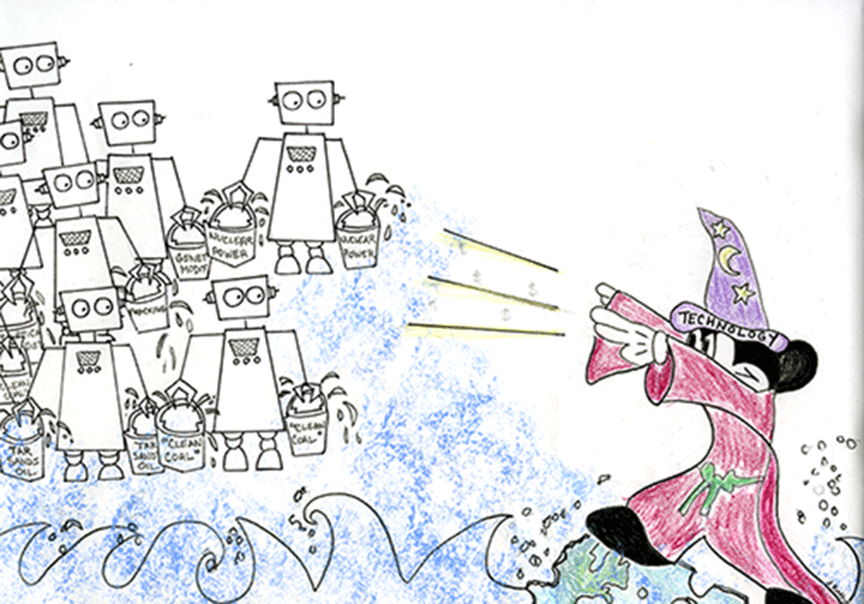
The technologists are like the sorcerer’s apprentice in Disney’s Fantasia. Driven primarily by the profit motive, the technologists operate from a limited perspective that seeks to maintain the status quo at all costs. And the costs and consequences are spinning wildly out of control. (Cartoon: Joanne Rothstein)
So what are we to do? How can a perspective that is deeply rooted in every aspect of our culture be transformed? And what can we do in the face of impending environmental catastrophe?
The dominant media message is to keep consuming as much as possible and trust that technological solutions will be found. Unfortunately, the promoted solutions—such as nuclear power or tar sands oil or “clean coal”—either come with a myriad of dangers or are purely delusional. The technologists are like the sorcerer’s apprentice in Disney’s Fantasia. Driven primarily by the profit motive, the technologists operate from a limited perspective that seeks to maintain the status quo at all costs. And the costs and consequences are spinning wildly out of control.
Countering that is the idea that we need to gather supplies and hunker down with weapons to protect ourselves when everything falls apart. The fallacy in the myth of the rugged individualist is that no one can gather enough supplies and weapons to protect him or herself against the forces of nature. If the Great Plains becomes a desert, no bag of beans will be big enough. No rifle will hinder a hurricane.
Both these approaches come from fear-based perspectives—that nature is an enemy that must be dominated and exploited; and that it’s everyone for him or herself. But there must be some way to move beyond fear, to engage each other and the world with creativity, with openness and flexibility.
According to Eliot Cowan, one of our Sacred Fire Community elders, and also according to many other wise teachers, the first step is to slow down, to sit by the fire and listen. Listen to the fire, to the wind, to the birds and insects, the animals and the trees, to the falling and flowing waters, to the people who are naturally drawn to the fire. Listen to your own heart. Be patient. Your innate wisdom, which lives in your heart and connects you to the wisdom of the world, will be warmed and awakened by the fire. Follow your heart’s direction. It will lead you to others whose hearts have been awakened. Together you will discover that the world is not just alive, but that it is constantly relating to you, nurturing and supporting you in every way, asking only that you acknowledge the validity of its livingness, that you engage it with gratitude and respect.
From that perspective of awareness, gratitude and respect—and with the continued guidance of wise teachers whose voices are gradually becoming more audible through the din of civilization—you will discover the fundamental truth that you are not alone, but part of an infinitely diverse community engaged in a magnificent adventure, the adventure of transformation. Clearly, there will be difficulties. Much will be lost. But there are always difficulties; there is always loss. Clearly, technologies will have to change. Clearly, it’s a good idea to stock some supplies, not just for yourself, but to share with your community when things are scarce. When you let go of fear and listen to your heart, you will discover that true abundance comes from living in relationship with each other and the living world, taking only what you need, discovering and giving back the gifts you were born to give. You will be filled with joy. You will be filled with wonder.
The Maya tell us that this is a time to celebrate. This New Dawn, this Apocalypse, is the growing revelation that we are all deeply connected, dependent on and obligated to each other. By acknowledging the sacred and interconnected nature of all life, by gathering in community and re-establishing our relationship with the living world, we will end the isolation of modern culture and build lives of meaning and purpose. We will be able to move with creativity, openness and flexibility when catastrophe strikes. And in this way, the people will live.
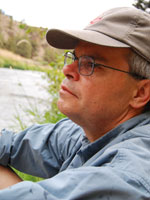 Jonathan Merritt is a marakame, an initiated traditional healer in the lineage of the Huichol people of Mexico. The founding editor, and currently a contributing editor for Sacred Fire magazine, Jonathan keeps a Sacred Fire Community fire in Portland, Oregon.
Jonathan Merritt is a marakame, an initiated traditional healer in the lineage of the Huichol people of Mexico. The founding editor, and currently a contributing editor for Sacred Fire magazine, Jonathan keeps a Sacred Fire Community fire in Portland, Oregon.
Do you stand for the sacred and interconnected nature of all life? Take our Stand for Sacredness.
Read the weather.com article here .
Read more about our Community fires and the dance of deep community.
What does this article bring up for you? Please share your heart by commenting on this post below.

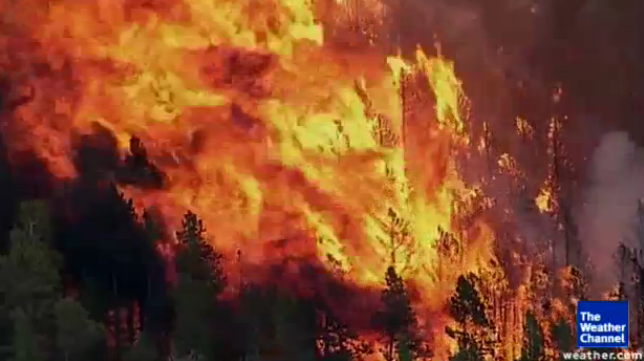


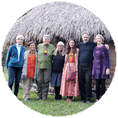

Jonathan, well put.
I recently found myself in that place of fear and the unknowing after a natural disaster called Irene. Although I will admit spirit had been sending me the message to commit to my calling, let that be your job. It took flood waters to wipe out my job as I knew it, the fear was in being a failure, not being able to support myself and of being unworthy. At the pinnacle of that fear I understood that I needed to go back to my roots, my basic practice, my Shamanic beliefs.
My heart is open with love and gratitude as I sit with grandfather fire daily and listen. I trust that I am in the right place, at the right time and that I am here to serve.
Thanks, Lesley.
Sometimes it takes those kinds of catastrophes to wake us to our heart’s calling. In my experience it is almost always something that we can’t ignore–like a grave illness or accident, the loss of someone we love, or a hurricane that washes away the familiarity and comfort of our lives–that causes us to be aware of the gift of our lives and our need to follow the guidance of our hearts, to give our specific gifts to the world.
If we can move through fear and not fall into the trap of suffering, if we can open our eyes to what is being revealed when the old life is washed away, then we can find our purpose and place in the world. We can be of service. We can thrive with gratitude and love.
I trust that your service is bringing benefit to your life and the lives of all that lives.
I appreciate what you have written and do not in any way wish to dispute that sitting and listening are important and necessary.
I felt moved to add something here because I can relate to that young man.
In my case, through sitting and listening I have been guided to do my work in the Human Body Project, which is active, challenging, messy, not necessarily nice or polite or happy work. In some ways I could say that I’ve done my sitting and listening and now I’m acting on the guidance I was given in that place. But my process is not so instrumental and linear and, as I do the active work, I also sit and listen.
I have also been involved in disappointing situations where people (including myself) have indulged in magical thinking about transformation.
It’s possible the young man felt like he had stumbled into that kind of group or maybe he felt that he already had the kind of guidance that sitting and listening can bring.
The line between sitting and listening and magical thinking is a difficult one, both to recognize inside oneself and to convey to others.
I also believe that “by gathering in community and re-establishing our relationship with the living world, we will end the isolation of modern culture and build lives of meaning and purpose,” however, what does that “end” look like? In my opinion, it looks like all the messy, scary manifestations we see around us, i.e., physical, paradoxical, present-day gunk! This is gunk we have to deal with, not just sit and listen away, says that young man perhaps, and also says me.
Also, I believe that there are many different paths to transformation. On several levels, I resonate with the spirit of this group. Conversely, I will never join the Mormon church, for instance. And, yet, I am aware that there are people in that faith who are doing hugely transformative work.
You make an important point, Tasha. It’s true that it is easy to fall into magical thinking, to imagine that all that is required is to sit and pray, that nothing actually needs to be done, though prayer itself is an important action that can have a profound effect on our lives and how we perceive the world. And when our prayers for guidance are answered, when the voice of our hearts that connects us to the living world finally becomes audible over the constant chatter of the mind, then we can act effectively with courage and resolution.
I too identify with the angry young man that I described. I once was that young man outraged over the ignorance and injustice of our culture. I wanted to and did throw myself into the fray only to find that my anger was not enough, that I could never overcome power through the force of my will, that by engaging in conflict in conventional ways–through social and political activism without the guidance of Heart, of Spirit–was utterly ineffectual.
Something else is called for. If the root illness is our fundamental separation from each other and the living world–manifested in the unconscious destructiveness in which we live–then the antidote is engaging in community, in gathering together not just as humans separate from the world, but as humans aware of and engaged with the livingness to which we belong. This is why sitting by the fire together is so important. As the fire transforms the wood into flame and smoke and ash, as the flames dance and the wind swirls the smoke around us, as we listen to the voices of our comrades and speak from our hearts, then we discover that we are not alone, that our concerns are also the concerns of others. And as we listen not just to the human voices, but to the wind through the trees, the rain gently falling, the owls in the woods, to the fire hissing and crackling, to something utterly unlanguagable, the voice of the living world, as we receive the guidance for which we are asking, then we know what to do and we can act in ways that are not unconscious or destructive.
And yes, community is messy. We do have to deal with this terrible gunky mess we’ve made and the only way we can do it is by digging in. It’s long, slow work. We might not make much progress in our lives, but it will open the door for our children and their children so that they can someday thrive in connection and relationship to the living world.
I applaud your work with the Human Body Project. It is brave, confrontive work of which I was unaware. And I’m certain that it could not be done or even imagined without the guidance of Heart.